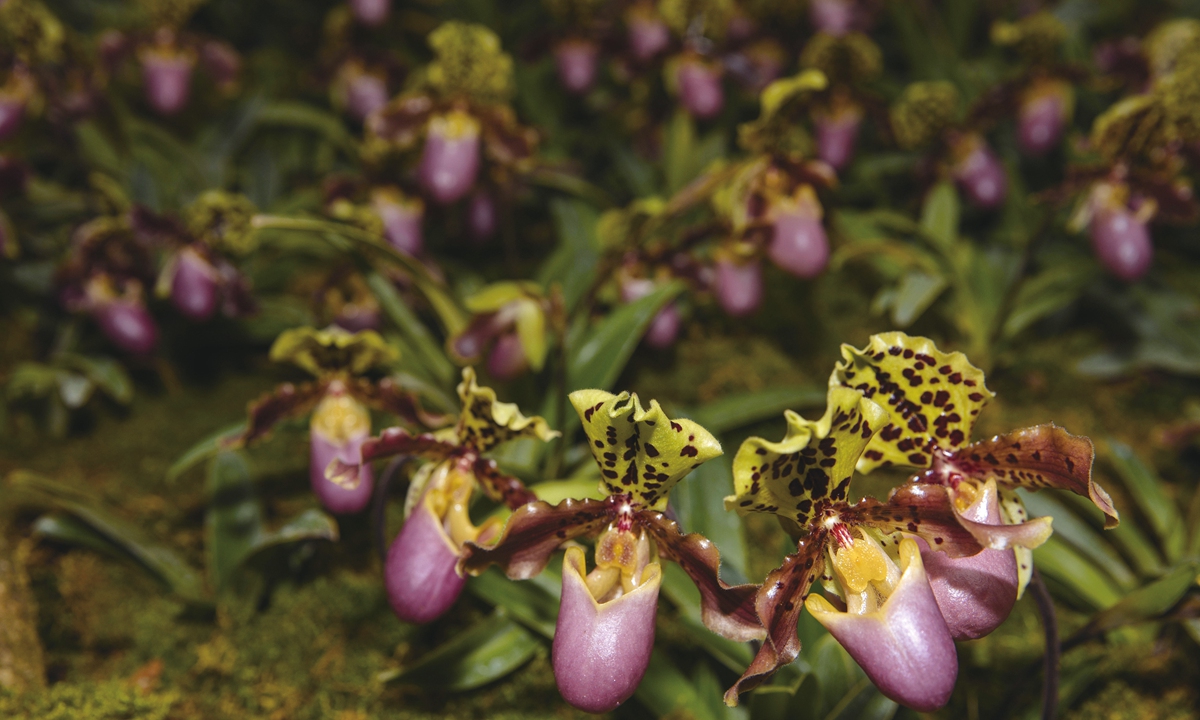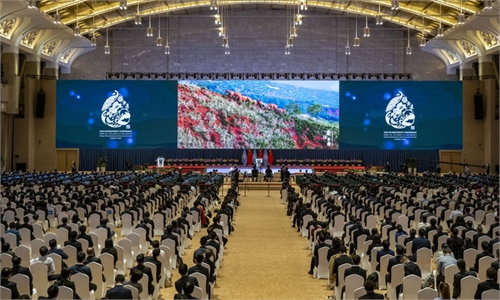Green BRI sets bright future for all life on Earth
China is leading on its commitment to biodiversity protection, in stark contrast with the US

Plants seen at the Fulingong Greenhouses in Kunming, Southwest China's Yunnan Province during the COP15 meeting. Photo: Li Hao/GT

Plants seen at the Fulingong Greenhouses in Kunming, Southwest China's Yunnan Province during the COP15 meeting. Photo: Li Hao/GT
At the COP15 in Kunming, Southwest China's Yunnan Province, as the host country, China exemplified its commitment to environmental conservation, while pointing out the direction for the future global biodiversity governance, especially among countries participating in the Belt and Road Initiative (BRI).
At COP15, that lasted from Monday to Friday, Chinese leader made a new push for building a community for all life on Earth. A key part of China's recent agenda is to promote China's ecological "red line" program, a move that has received wide-ranging support from foreign representatives at the meeting, and is expected to help with global biodiversity conservation if applied to other countries, initially to BRI countries
The program, which in 2011 moved to identify China's crucial ecological zones and enforces strict protection in those areas, could be promoted in other countries after a British scholar published research to demarcate red lines for some Asian countries based on Chinese methods, projected preliminary results showed the findings were in line with local conditions, Gao Jixi, director of the Center for Satellite Application on Ecology and Environment of the MEE, told the Global Times on the sidelines of COP15 in Kunming.
China is working with international organizations to jointly develop a toolkit on how to demarcate the red lines, and will promote it amongst suitable partner countries, Gao said, noting that BRI countries would be the first landing grounds for the program.
As the practitioner of the green BRI, China has authorized the implementation of over 30 ecological-related multilateral conventions or protocols with faithful commitment.
As one of the first countries to sign and ratify the United Nations "Convention on Biological Diversity," China has established more than 10,000 natural reserves of various types, accounting for about 18 percent of the land area, and realized 17 percent requirement determined by the Aichi Biodiversity Targets of the convention, according to media reports.
China has been relentless in making the best of its abilities in supporting developing countries to upgrade their capabilities in environmental governance, as part of China's efforts in sharing its experiences to the world.
The BRI International Green Development Coalition (BRIGC) was established after the second Belt and Road Forum in April 2019, and has so far successively carried out environmental protection exchanges and cooperation initiatives with more than 100 countries, and implemented a large number of biodiversity cooperation projects.
China has also built big data service platform for eco-environmental protection and provide data support for the "Belt and Road" green development.
China regards cooperation as the key content of high-quality co-construction of the "Belt and Road", and adopts a series of measures such as green infrastructure, green energy, and green finance to provide funding, technology, and capacity building support to countries along the routes to help them accelerate green development, media reports.
One good example is the Karot Hydropower Project, a priority project within the China-Pakistan Economic Corridor, with a total investment of $1.74 billion.
Prior to construction getting underway, the Chinese companies conducted a biodiversity survey covering conduct critical habitat assessments and adopted various measures to protect local fish.
The hydropower project is expected to be put into commercial operation by the end of December, and will be able to provide Pakistan with about 3.2 billion kWh of clean electricity each year, servicing 5 million people, but also expected to reduce carbon dioxide emissions by 3.5 million tons per year, according to media reports.
Another example is Sino-Africa Joint Research Center in Kenya, a key project of the Belt and Road Initiative International Green Development Coalition, in which the Chinese side mainly provides technology, facilities and training for African partners, and jointly conducts research on rare plants in Africa, as well as provides protection of plant diversity.
Up to now, the center has launched dozens of cooperative research projects and trained hundreds of graduate students, training management and professional technical personnel for Africa.
Other example that has won international recognition is the thoughtful design of the Mombasa-Nairobi Railway. On the basis of investigating the living habits and migration paths of wild animals, a total of 14 large-scale wild animal passages and 79 bridges have been set up along the Mombasa-Nairobi Railway. The clear height of all bridge-type animal passages is above 6.5 meters, and giraffes can pass without bending their long necks, local media reported.
China's commitment on carbon transformation from fossil fuels to green energy such as solar and wind is another good example of China's responsible approach to global environmental protection.
In stark contrast with China's commitment and its leading role as part of the green BRI, some countries such as the US have been setting an opposite example to the world eco-environmental protection.
While the Convention on Biological Diversity has more parties than almost any other international conventions on environment, the US, after signing the convention in the 1990s, has not yet ratified it.
Speaking about this matter, Chinese foreign ministry spokesperson Zhao Lijian told media at a regular press conference on Wednesday that "as the largest country in the world, the absence of the US has undermined global efforts in protecting biodiversity and preventing the extinction of species."
The US should stop seeking instant benefits when participating in international affairs at an early date, shoulder its due international responsibilities and obligations, taking into account the wellbeing of the world's people and take concrete actions to win the trust of the international community, said Zhao.


